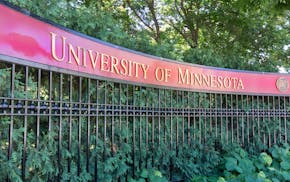Not long ago, a University of Minnesota student accidentally dialed 911 when she was at a busy restaurant.
Because the call came from her cellphone, university police couldn't get a lock on her exact location. Nor could they tell, through all the noise, whether it was a real emergency.
But they knew her name and other contact information, thanks to a service called Smart911, which the university started offering in September. It allows individuals to create a personal profile that pops up automatically when they call 9-1-1.
As a result, the police were able to contact her roommate and find out quickly that it was a false alarm.
"In our business, in public safety, seconds can save lives," said Jeff Lessard, manager of the university's Public Safety Emergency Communication Center, or 911 call center. This is one way, he said, to give emergency responders a heads up in a world dominated by cellphones, which have an iffy track record identifying a caller's location.
Lessard said the U decided early this year to try out Smart911, which is offered free to students and employees on the Twin Cities campus. The university pays an annual fee of $6,450, he said.
One problem is that many students show up at college with cellphones registered to their parents. In a true emergency, Lessard said, if they call 911 and are unable to speak, the dispatcher may have to track down the parents through the cellphone company, and ask, "How can we get a hold of them?"
With Smart911, he said, students can register their home address or other frequent locations, emergency contacts, and medical conditions, which any participating 911 call center can access instantly.
Of course, they might not be at a predesignated location when they call for help, Lessard acknowledged. But "it's designed to cut down on the amount of time that we might have to spend trying to track somebody down."
It also can give emergency responders vital information — for example, if a caller has a history of seizures or is hearing-impaired, he said.
Second spot in Minnesota
So far, the Twin Cities campus is only the second spot in Minnesota to offer the service, after Winona County. Nationwide, it's now available in about 10 percent of all 911 call centers, according to Rave Mobile Safety, the Massachusetts company that operates Smart911.
Of course, many of the calls are accidental "pocket dials," as Lessard calls them. People don't even know they've called 911, and even if the dispatcher calls right back, the individual may ignore the call. This way, he said, "at least I'm going to have some information on your emergency contacts."
Individuals can even disclose whether they have pets at home. If someone ends up in the hospital, he said, that kind of information could pay off.
"We might take the extra step to make sure that pet is going to be cared for."
maura.lerner@startribune.com.

Going to Wolves or Twins tonight? How to get there (and maybe avoid traffic).
Focusing on bringing football film into frame
